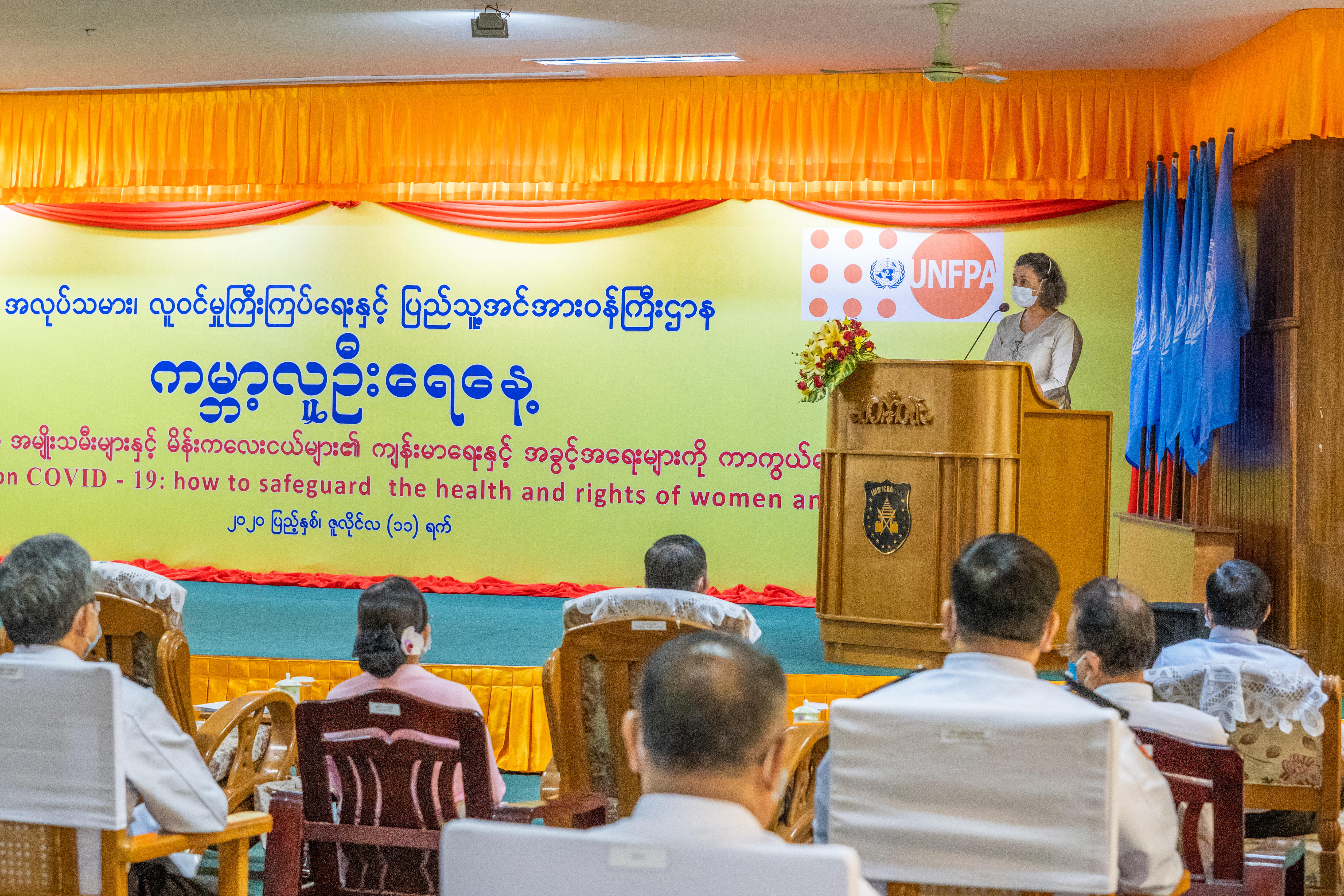NAY PYI TAW, Myanmar – With the theme “Putting the brakes on COVID-19: how to safeguard the health and rights of women and girls now”, World Population Day 2020 commemoration ceremony was held in Nay Pyi Taw on 11 July 2020.
The ceremony was attended by HE U Thein Swe, Union Minister for Labour, Immigration and Population, Ms. Nelida Rodrigues, Deputy Representative of UNFPA. Also in attendance were various government departments and Civil Society Organizations.
Speech delivered by Ms. Nelida Rodrigues, Deputy Representative of UNFPA in Myanmar.
Union Minister for the Ministry of Labour, Immigration and Population, Your Excellency U Thein Swe
Senior Government officials present
Colleagues from the UN
Distinguished Ladies and Gentlemen
Good morning and Mingalabar!
Let me start by conveying heartfelt apologies from our Representative, Mr. Ramanathan Balakrishnan, who is not able to join us today due to administrative reasons related to the COVID-19 context. He sends his highest regards to you, Excellency, and your team, and he asked me to personally convey his most sincere apologies.
Excellency, it is an honour to join you today to commemorate the occasion of the World Population Day for 2020, under a very important theme: Putting the brakes on COVID-19: how to safeguard the health and rights of women and girls now.
The COVID-19 crisis has taken a staggering toll on people, communities and economies everywhere. But not everyone is affected equally. Women, who account for the largest share of caregivers and front-line health workers, for example, are disproportionately exposed to the coronavirus.
Supply chains around the world are being disrupted, impacting the availability of contraceptives and heightening the risk of unintended pregnancy. As countries are on lockdown and health systems struggle to cope, sexual and reproductive health services are being sidelined and gender-based violence is on the rise.
Recent UNFPA research highlighted that if the lockdown continues for 6 months about 31 million additional cases of gender-based violence can also be expected.
Moreover, women disproportionately work in insecure labour markets and are harder hit by the economic impacts of COVID-19. Nearly 60 per cent of women worldwide work in the informal economy, at greater risk of falling into poverty.
Women’s unpaid care work has increased as a result of school closures and the increased needs of older people. The pandemic is hitting marginalized communities particularly hard, deepening inequalities and threatening to set us back in our efforts to leave no one behind.
Our response to COVID-19 in every country is critical and will determine how fast the world recovers and whether we achieve the Sustainable Development Goals or not.
On 11 July, World Population Day, we encourage the Department of Population, the Department of Social Welfare and the Ministry of Health and Sports to raise awareness about the sexual and reproductive health needs and vulnerabilities of women and girls during the pandemic, to highlight how we can safeguard hard-fought gains and ensure that sexual and reproductive health and rights stay on the Myanmar government agenda, and to explore how to maintain the momentum towards achieving the SDGs by 2030 that Myanmar, through the Minister of Labour, Immigration and Population, promised at the Nairobi Summit in November last year.
Allow me, Excellency, at this juncture, to take this opportunity to congratulate you and your team for the conclusion of the Inter-censal Survey and humbly request that provisional data is made available to development partners and other humanitarian actors when possible. Excellency, with great satisfaction we supported the collection of that data so that Myanmar people can use them for precise occasions like the one we have now.
We believe that The data from the inter-censal survey is the only and most reliable data to form a credible baseline for any other studied that will be conducted to assess the impact of COVID-19 on the people of Myanmar, particularly women and girls.
This is why UNFPA has written to your office, requesting the provisional results to be released so that development actors can use reliable and accurate data to respond to COVID-19. If we do not use that data in a situation like this, then that investment is not worth it. We look forward to your usual positive consideration to our requests, and your usual flexibility in making data available to the public in Myanmar.
Excellency, let me take this opportunity to reiterate UNFPA’s support towards ensuring that the sexual and reproductive rights of all women and girls in Myanmar, regardless of ethnicity, religion or geographical location, are respected and met in Myanmar.
We pledge to continue our support towards the aspirations of the people of Myanmar, as expressed in the Myanmar Sustainable Development Plan (MSDP).
We also commit ourselves to ensure that the sexual and reproductive rights of women and girls remain high in the agenda of the government of Myanmar, including in crisis situations such as the COVID-19 pandemic.
Excellency, ladies and gentlemen, I thank you for your attention.


